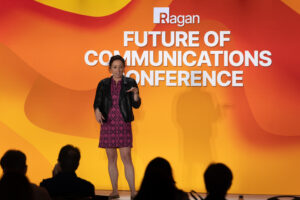What communicators wish the C-suite knew about their work
Among the top answers: PR takes time and good comms requires early access.

Communicators often find themselves misunderstood. It can be difficult to get C-suite leaders to listen and understand what the profession truly is – and how it contributes to the bottom line.
So I took to LinkedIn to ask communicators what they wish C-suite leaders knew about their work.
Here’s a sampling of the responses, edited for length and style.
***
It’s important for C-suite to see Communications as a strategic lever that can support both business and people objectives. Reputation, perception, whether top employees stay or leave the company – all are driven by communications in partnership with nearly every business function. I love leading business unit communications for this reason. We can impact everything for the better!
Monique Kelley Gigliotti, consultant/fractional corporate and marketing communications head and associate professor at Boston University.
***
We aren’t the mafia. We can’t “call in favors” to our pals at top tier outlets.
Parry Headrick is founder of Crackle PR.
***
That communications is not a tactical output function but a strategic outcomes driver. Engage communications early and frequently to help inform decisions – before they are made – for insights on potential audience impacts and proposed course of action.
Trish Nicolas is executive vice president and head of the Americas at rf.engage.
***
Nearly every decision or action today involves communicating, which means communications should have a seat at the table. It’s the difference between being proactive and strategic vs. reactive
Ben Haber is executive vice president at Racepoint Global.
***
PR should not be measured like digital marketing. Look at both data-driven metrics (UVM, circulation) and sentiment-driven metrics (article tone, comments, customer feedback).
Heather Jones is a PR and influencer marketing consultant.
***
Not all things require a PR push. Some things are not newsworthy and bad pushes can result in bad relationships with journalists. There are other ways to market things that are not PR-worthy, like paid media. It’s okay to go that route versus clog the inboxes of journalists with non-news stories.
Victoria Barnett is public relations manager at The Abbi Agency.
***
When you as a leader and/or executive invest in PR, the results will be better. Your time as a leader spent with your PR team is just as important to the success of your PR program as your team’s skillset.
Rachel Stoczko is communications & marketing lead at Planet FWD.
***
Your “brand” is not something that lives off to the side as a set of creative assets and colors. It’s everything about how you show up in the market, which means that comms needs to be a part of any activity or decision that could impact the way stakeholders perceive your company.
How your employees talk about their experience = brand. Where you invest your CSR dollars = brand. How your facilities look, feel, and function = brand. How ethically you behave = brand. I could go on…
Caitlin Hayden is group communications director at BAE Systems.
***
Make deposits in your reputation piggy bank — every brand interaction, piece of content, quote, speaking engagement, useful conference swag, adds up and builds reputation equity — which you’ll need to draw upon in times of issues and crisis management.
Margaret Fogarty is global brand manager for Nutrien.
***
While internal/corp comms may not have a direct impact on company financials/KPIs, it’s integral to driving results. Consider a product rollout. Without proper comms planning, training, and support, the product could fail, ultimately impacting the bottom line.
Alison Turczak is senior communications manager at Subway.
***
Research is not a “nice to have” or an afterthought, but an important part of the public relations and crisis management processes. Let the PR pros recommend the research investment and please stop questioning the line item. It’s there because it matters and will save more money in the long run by helping to ensure better targeted, creative and meaningful conversations, campaigns, and crisis responses
Amy Shanler is associate professor and director of PRLab at Boston University.
***
The biggest media wins can sometimes be the coverage that doesn’t run because your communicator was responsive and educated the reporter
Jeff Carter is senior advisor to the Office of Trade at U.S. Customs and Border Protection.
***
Being asked/told to partake in media training is not indicative of you being a poor communicator nor should it be brushed off. Media can be a different beast than any other audience you have dealt with!
Shira Levitt is director at Capstone Hill Search.
***
When done right, this work isn’t easy neither is success.
Heather Woodard is director of external communications & community impact at H&R Block.








Communications is vital for strategic success, influencing reputation, employee retention, and business objectives through effective partnership.